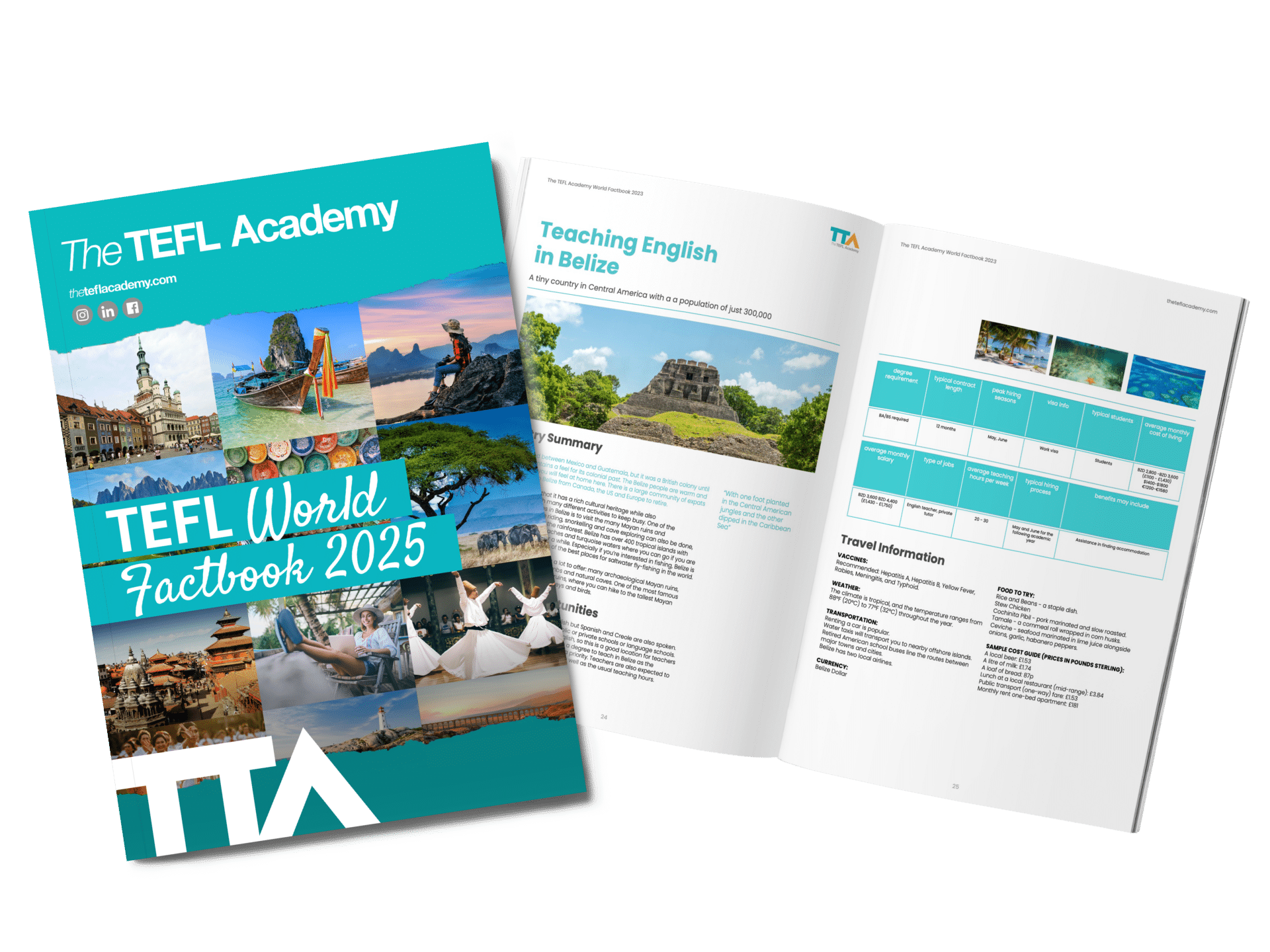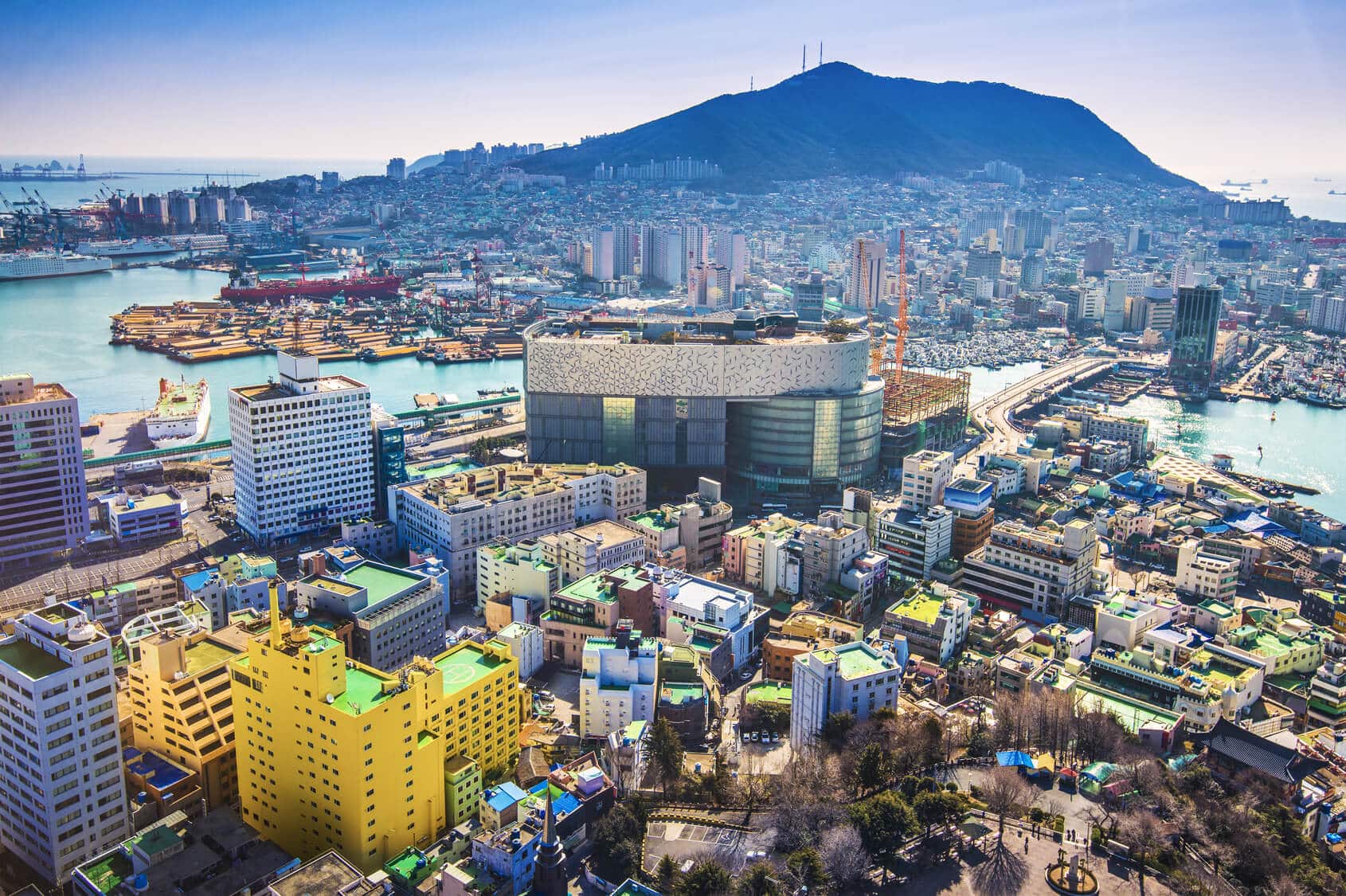Teach English in Philippines
a world of opportunities
Join a global community of over 200,000 TEFL teachers working throughout the world! Enrol me!
Contents
Why teach in the Philippines
Where to teach
How to qualify
Visa requirements
Teaching experience
TEFL certification
Degree requirements
Non-native speakers
Startup capital
Types of jobs
Average salaries
Cost of living
Life and culture
Keen to explore over 7,000 islands, meet some of the friendliest people in the world, snorkel to your heart’s content, and eat like a king? Then the Philippines is the place for you!
The Philippines will spoil you with towering volcanoes, paddy fields as far as the eye can see and a beautiful coastline ringed by coral reefs – and amazing teaching opportunities. You might not think so, but the Philippines is a great place for a TEFL teacher!
Why teach English in the Philippines
The Philippines is a former American colony and more than 92% of the population can speak English. People from neighbouring South East Asian countries often travel to the Philippines to learn English, which creates opportunities for TEFL teachers.
But that’s not all! In the Philippines you’ll find:
- Beautiful surroundings: As a teacher in the Philippines you will be amazed by your surroundings every day. Who wouldn’t want to work in an environment with sandy beaches, tropical rainforests, and stunning mountain ranges?
- Cultural diversity: In the Philippines you’ll get the opportunity to be exposed to elements of indigenous Spanish, American, and Chinese influences. You will experience this cultural diversity in the wonderful music, art, food, and festivals of the Philippines.
- Travel opportunities: If you choose to make the Philippines your base, you’ll be able to easily and cheaply travel to its neighbouring countries. A quick flight can take you to Malaysia, Indonesia, Vietnam, Taiwan or mainland China.
Best places to teach English in the Philippines
Where you decide to teach will play a big role in the quality of life you experience in the Philippines. In large cities, teachers will gain a lot of experience but are expected to work hard and sometimes long hours. In rural areas, teachers will have to be innovative with limited supplies but will have flexible teaching hours.
Manila
For the big city-lovers
Manila is the capital of the Philippines and home to about 12 million people. Known for being crowded and having terrible traffic jams, it’s a cosmopolitan city with a lot to offer teachers. Many of the international schools in the Philippines are located in Manila.
The city offers beautiful churches, a diverse culture, an interesting colonial history, gigantic malls, bustling markets, hidden architectural gems and vibrant nightlife. English is widely spoken in the city and teachers should find it easy to adapt in Manila. Manila has a humid tropical climate and enjoys hot temperatures all year round.
Cebu
For the beach-lover
Cebu is located in the south of the Philippines. The city is known for commerce, trade and education. In Cebu, you will find a well-established English-language school industry (many Koreans and Chinese study here) and well-regarded universities (which draw Filipinos from across the nation).
Teachers choosing Cebu will enjoy white sandy beaches, museums, street markets and outdoor pursuits such as snorkelling and scuba diving. Cebu has a vibrant nightlife and great restaurants to choose from.
Baguio
For ambitious teachers
Baguio is a big university town in the Philippines that boasts a student population of about 250,000 students. Teachers looking for positions at universities should definitely look at Baguio as a destination.
Nature lovers will love the fresh air and the awesome view of the mountains that Baguio has to offer. Baguio is known for its mild climate and many people choose the city to get a break from the tropical heat. Temperatures range between 15-23°C.
How do I become an English teacher in the Philippines?
If you are interested in teaching in the Philippines, then you should make sure that you have the following things in place:
- A Bachelor’s degree. Your degree does not have to be in Education, any field will do. If you want to teach at a University you will need a Master’s degree.
- Be a native English speaker. Teachers from the USA, Canada, the UK, Ireland, Australia, New Zealand and South Africa are preferred.
- Have a clean police clearance certificate.
- At least a 120-hour TEFL certification.
The TEFL Academy offers a Level 3 120-hour TEFL Course or a Level 5 168-hour TEFL Course. The Level 5 course can be completed online or with 10 hours of in-classroom training. If completed online, you can add a Level 5 Observed Teaching Practice Course – a practical course that can be done online.
Do you need a visa for teaching English in the Philippines?
Yes, you do. As a foreigner, you will have to apply for an Alien Employment Permit. You can only do this if you already have a job offer and your school will sponsor this permit for you. This permit is valid between six months and two years. With an Alien Employment Permit, you can apply for a working visa. Your school will assist you, but you will need the following documentation:
- A school or organisation that sponsors you in the Philippines
- A passport that is valid for 6 months
- A locally issued medical certificate
- A locally issued police clearance certificate
Do I need teaching experience to teach in the Philippines?
The standard of English is very high in the Philippines. Teachers who want well-paid positions need at least one to two years of teaching experience. Without teaching experience, you might find it more challenging to find a full-time job but you could find a tutoring, volunteering or intern position.
As a tutor, volunteer or intern you can gain valuable experience in the TEFL classroom. This is a good option for new teachers who can then add teaching experience to their CVs.
Which TEFL certificate do I need to teach in the Philippines?
To get a working visa, the Filipino government requires you to have a TEFL certificate. If you are serious about teaching English in the Philippines then the best thing you can do is get yourself TEFL qualified with a TEFL certificate that is a minimum of 120 hours.
The TEFL Academy is the perfect place to get qualified – the first step to finding that perfect job in the Philippines. Getting your TEFL certification through The TEFL Academy will set you on track to teach in the Philippines.
Can I teach English in the Philippines with no degree?
You need a Bachelor’s degree to teach English in the Philippines. The competition for TEFL positions is really high and the more qualified you are, the more likely you are to find a job. For positions at universities, you need a Master’s degree.
Can non-native speakers teach English in the Philippines?
Schools in the Philippines prefer teachers from the USA, Canada, the UK, Ireland, Australia, New Zealand and South Africa. Non-native speakers need to prove their English is at an Advanced level or higher (C1 according to the CEFR).
How much start-up capital do I need?
Start-up costs are the basic costs you will need to survive from when you arrive in the Philippines until you receive your first Paycheque. Most schools in the Philippines will not pay you upfront, so it is important to have between ₱38,000 – ₱83,000 ($700 – $1,500 USD) available to set yourself up in the Philippines.
Below is a breakdown of costs you might incur to start off in the Philippines:
- Accommodation: One month’s rent and a security deposit.
- TEFL certification: A TEFL course can cost between $100 and $500, depending on the length and level of the course and the course provider.
- Document fees: Any costs related to certifying and notarising your degree and TEFL certificate.
- Flight ticket: Variable.
- Visa application: The cost of an Alien Employment Visa is around $200.
- Living expenses: You will need one month’s worth of start-up capital of about $500 to help you settle in the Philippines.
Types of English teaching jobs in the Philippines
The Philippines has a very competitive TEFL job market. There are a variety of teaching jobs available in the Philippines, each with its own unique requirements. Here is a brief overview of the most common teaching jobs in the Philippines:
Universities
At universities in the Philippines, most students have to pass an English proficiency test. This creates a lot of positions at Universities for TEFL teachers. Universities pay well and teachers can expect benefits like free housing and health insurance. Teachers looking to teach at universities should have advanced teaching experience and a Master’s degree.
Public schools
Public schools in the Philippines do not have a lot of funding. Teachers will most likely find positions in public schools that are located in rural areas. In public schools the class sizes are big and there is a lack of materials. Teaching in a public school is a great opportunity for teachers who want to make a difference and experience rural Philippines.
Private lessons
Private one-on-one tutoring is very popular in the Philippines. Teachers who choose this option can determine their own hours and price. Many teachers employed at schools in the Philippines make use of private lessons to substitute for their income.
What is the average salary for teaching in the Philippines?
There are a variety of teaching opportunities in the Philippines for English teachers. Your salary will differ based on which teaching route you choose to follow.
- Private language schools: ₱66,000 – ₱110,000 ($1,200 – $2,000) a month
- International schools: ₱83,000 – ₱166,000 ($1,500 – $3,000) a month
- Public schools: ₱45,000 – ₱83,000 ($800 – $1,500) a month
- Universities: ₱83,000 – ₱122,000 ($1,500 – $2,200) a month
What is the cost of living in the Philippines?
The Philippines is an affordable country to live in compared to Europe, the UK and the USA, but compared to other Southeast Asian countries the Philippines is more expensive. Teaching salaries are competitive and teachers will be able to live a comfortable life in the Philippines.
But let’s break it down.
Accommodation
- One-bedroom apartment in the city centre: ₱18,000 ($325) a month
- One-bedroom apartment outside the city centre: ₱10,000 ($180) a month
Utilities
- Electricity, water, and gas: ₱5,000 ($96) a month
Food and groceries
- Monthly shop: ₱11,000 ($220) a month
- Meal at an inexpensive restaurant: ₱200 ($4)
Transport
- Monthly pass: ₱722 ($13)
Internet
- Unlimited: ₱2,000 ($35) a month
Entertainment
Gym, cinema, clubbing: ₱8,300 ($150) a month
What's it like to live and work in the Philippines?
- Code-switching is very common in the Philippines. As a foreigner, you might get confused when Filipinos make use of Taglish. Taglish is a combination of English and Tagalog.
- Time is slower in the Philippines. Teachers will have to get used to things not always starting on time. Filipinos have a very laid-back outlook on life.
- Food is seen as the love language of Filipinos. People in the Philippines are known to be extremely friendly and hospitable. It is not uncommon for foreigners to be invited over to locals’ houses for meals. These meals are usually quite extensive and a wonderful culinary celebration.
- Like most Asian countries the traffic in the Philippines is heavy and chaotic. A great way to get around in the Philippines is by ferry. Teachers should use their time off to island hop via ferries and explore the Philippines.
The Philippines is a wonderful place to work as a teacher. From the idyllic beaches and sky-high mountains to the bustling cities and heritage sites, you’ll have an amazing adventure as a TEFL teacher in the Philippines.
Start your TEFL journey with an accredited TEFL course provider.
Contents
Keen to explore over 7,000 islands, meet some of the friendliest people in the world, snorkel to your heart’s content, and eat like a king? Then the Philippines is the place for you!
The Philippines will spoil you with towering volcanoes, paddy fields as far as the eye can see and a beautiful coastline ringed by coral reefs – and amazing teaching opportunities. You might not think so, but the Philippines is a great place for a TEFL teacher!
Why teach English in the Philippines
The Philippines is a former American colony and more than 92% of the population can speak English. People from neighbouring South East Asian countries often travel to the Philippines to learn English, which creates opportunities for TEFL teachers.
But that’s not all! In the Philippines you’ll find:
- Beautiful surroundings: As a teacher in the Philippines you will be amazed by your surroundings every day. Who wouldn’t want to work in an environment with sandy beaches, tropical rainforests, and stunning mountain ranges?
- Cultural diversity: In the Philippines you’ll get the opportunity to be exposed to elements of indigenous Spanish, American, and Chinese influences. You will experience this cultural diversity in the wonderful music, art, food, and festivals of the Philippines.
- Travel opportunities: If you choose to make the Philippines your base, you’ll be able to easily and cheaply travel to its neighbouring countries. A quick flight can take you to Malaysia, Indonesia, Vietnam, Taiwan or mainland China.
Best places to teach English in the Philippines
Where you decide to teach will play a big role in the quality of life you experience in the Philippines. In large cities, teachers will gain a lot of experience but are expected to work hard and sometimes long hours. In rural areas, teachers will have to be innovative with limited supplies but will have flexible teaching hours.
Manila
For the big city-lovers
Manila is the capital of the Philippines and home to about 12 million people. Known for being crowded and having terrible traffic jams, it’s a cosmopolitan city with a lot to offer teachers. Many of the international schools in the Philippines are located in Manila.
The city offers beautiful churches, a diverse culture, an interesting colonial history, gigantic malls, bustling markets, hidden architectural gems and vibrant nightlife. English is widely spoken in the city and teachers should find it easy to adapt in Manila. Manila has a humid tropical climate and enjoys hot temperatures all year round.
Cebu
For the beach-lover
Cebu is located in the south of the Philippines. The city is known for commerce, trade and education. In Cebu, you will find a well-established English-language school industry (many Koreans and Chinese study here) and well-regarded universities (which draw Filipinos from across the nation).
Teachers choosing Cebu will enjoy white sandy beaches, museums, street markets and outdoor pursuits such as snorkelling and scuba diving. Cebu has a vibrant nightlife and great restaurants to choose from.
Baguio
For ambitious teachers
Baguio is a big university town in the Philippines that boasts a student population of about 250,000 students. Teachers looking for positions at universities should definitely look at Baguio as a destination.
Nature lovers will love the fresh air and the awesome view of the mountains that Baguio has to offer. Baguio is known for its mild climate and many people choose the city to get a break from the tropical heat. Temperatures range between 15-23°C.
How do I become an English teacher in the Philippines?
If you are interested in teaching in the Philippines, then you should make sure that you have the following things in place:
- A Bachelor’s degree. Your degree does not have to be in Education, any field will do. If you want to teach at a University you will need a Master’s degree.
- Be a native English speaker. Teachers from the USA, Canada, the UK, Ireland, Australia, New Zealand and South Africa are preferred.
- Have a clean police clearance certificate.
- At least a 120-hour TEFL certification.
The TEFL Academy offers a Level 3 120-hour TEFL Course or a Level 5 168-hour TEFL Course. The Level 5 course can be completed online or with 10 hours of in-classroom training. If completed online, you can add a Level 5 Observed Teaching Practice Course – a practical course that can be done online.
Do you need a visa for teaching English in the Philippines?
Yes, you do. As a foreigner, you will have to apply for an Alien Employment Permit. You can only do this if you already have a job offer and your school will sponsor this permit for you. This permit is valid between six months and two years. With an Alien Employment Permit, you can apply for a working visa. Your school will assist you, but you will need the following documentation:
- A school or organisation that sponsors you in the Philippines
- A passport that is valid for 6 months
- A locally issued medical certificate
- A locally issued police clearance certificate
Do I need teaching experience to teach in the Philippines?
The standard of English is very high in the Philippines. Teachers who want well-paid positions need at least one to two years of teaching experience. Without teaching experience, you might find it more challenging to find a full-time job but you could find a tutoring, volunteering or intern position.
As a tutor, volunteer or intern you can gain valuable experience in the TEFL classroom. This is a good option for new teachers who can then add teaching experience to their CVs.
Which TEFL certificate do I need to teach in the Philippines?
To get a working visa, the Filipino government requires you to have a TEFL certificate. If you are serious about teaching English in the Philippines then the best thing you can do is get yourself TEFL qualified with a TEFL certificate that is a minimum of 120 hours.
The TEFL Academy is the perfect place to get qualified – the first step to finding that perfect job in the Philippines. Getting your TEFL certification through The TEFL Academy will set you on track to teach in the Philippines.
Can I teach English in the Philippines with no degree?
You need a Bachelor’s degree to teach English in the Philippines. The competition for TEFL positions is really high and the more qualified you are, the more likely you are to find a job. For positions at universities, you need a Master’s degree.
Can non-native speakers teach English in the Philippines?
Schools in the Philippines prefer teachers from the USA, Canada, the UK, Ireland, Australia, New Zealand and South Africa. Non-native speakers need to prove their English is at an Advanced level or higher (C1 according to the CEFR).
How much start-up capital do I need?
Start-up costs are the basic costs you will need to survive from when you arrive in the Philippines until you receive your first Paycheque. Most schools in the Philippines will not pay you upfront, so it is important to have between ₱38,000 – ₱83,000 ($700 – $1,500 USD) available to set yourself up in the Philippines.
Below is a breakdown of costs you might incur to start off in the Philippines:
- Accommodation: One month’s rent and a security deposit.
- TEFL certification: A TEFL course can cost between $100 and $500, depending on the length and level of the course and the course provider.
- Document fees: Any costs related to certifying and notarising your degree and TEFL certificate.
- Flight ticket: Variable.
- Visa application: The cost of an Alien Employment Visa is around $200.
- Living expenses: You will need one month’s worth of start-up capital of about $500 to help you settle in the Philippines.
Types of English teaching jobs in the Philippines
The Philippines has a very competitive TEFL job market. There are a variety of teaching jobs available in the Philippines, each with its own unique requirements. Here is a brief overview of the most common teaching jobs in the Philippines:
Universities
At universities in the Philippines, most students have to pass an English proficiency test. This creates a lot of positions at Universities for TEFL teachers. Universities pay well and teachers can expect benefits like free housing and health insurance. Teachers looking to teach at universities should have advanced teaching experience and a Master’s degree.
Public schools
Public schools in the Philippines do not have a lot of funding. Teachers will most likely find positions in public schools that are located in rural areas. In public schools the class sizes are big and there is a lack of materials. Teaching in a public school is a great opportunity for teachers who want to make a difference and experience rural Philippines.
Private lessons
Private one-on-one tutoring is very popular in the Philippines. Teachers who choose this option can determine their own hours and price. Many teachers employed at schools in the Philippines make use of private lessons to substitute for their income.
What is the average salary for teaching in the Philippines?
There are a variety of teaching opportunities in the Philippines for English teachers. Your salary will differ based on which teaching route you choose to follow.
- Private language schools: ₱66,000 – ₱110,000 ($1,200 – $2,000) a month
- International schools: ₱83,000 – ₱166,000 ($1,500 – $3,000) a month
- Public schools: ₱45,000 – ₱83,000 ($800 – $1,500) a month
- Universities: ₱83,000 – ₱122,000 ($1,500 – $2,200) a month
What is the cost of living in the Philippines?
The Philippines is an affordable country to live in compared to Europe, the UK and the USA, but compared to other Southeast Asian countries the Philippines is more expensive. Teaching salaries are competitive and teachers will be able to live a comfortable life in the Philippines.
But let’s break it down.
Accommodation
- One-bedroom apartment in the city centre: ₱18,000 ($325) a month
- One-bedroom apartment outside the city centre: ₱10,000 ($180) a month
Utilities
- Electricity, water, and gas: ₱5,000 ($96) a month
Food and groceries
- Monthly shop: ₱11,000 ($220) a month
- Meal at an inexpensive restaurant: ₱200 ($4)
Transport
- Monthly pass: ₱722 ($13)
Internet
- Unlimited: ₱2,000 ($35) a month
Entertainment
Gym, cinema, clubbing: ₱8,300 ($150) a month
What's it like to live and work in the Philippines?
- Code-switching is very common in the Philippines. As a foreigner, you might get confused when Filipinos make use of Taglish. Taglish is a combination of English and Tagalog.
- Time is slower in the Philippines. Teachers will have to get used to things not always starting on time. Filipinos have a very laid-back outlook on life.
- Food is seen as the love language of Filipinos. People in the Philippines are known to be extremely friendly and hospitable. It is not uncommon for foreigners to be invited over to locals’ houses for meals. These meals are usually quite extensive and a wonderful culinary celebration.
- Like most Asian countries the traffic in the Philippines is heavy and chaotic. A great way to get around in the Philippines is by ferry. Teachers should use their time off to island hop via ferries and explore the Philippines.
The Philippines is a wonderful place to work as a teacher. From the idyllic beaches and sky-high mountains to the bustling cities and heritage sites, you’ll have an amazing adventure as a TEFL teacher in the Philippines.
Start your TEFL journey with an accredited TEFL course provider.

Download the World TEFL Factbook
We have created a unique TEFL World Factbook of teaching abroad guides in over 100 countries to help TEFL teachers decide where in the world to teach English. Each country profile outlines everything a TEFL teacher would need to know including average pay, living costs, working environments and even the weather!
Download TEFL Factbook
TEFL Jobs In Asia
View AllOther Places In Asia
View AllTeach English Abroad Articles
View All-
 Resources
ResourcesTeaching On Wall Street English: What You Need To Know
2025-06-30
-
 Resources
ResourcesAwesome English Idioms For EFL Learners – And How To Teach Them
2025-06-27
-
 Teaching English Abroad Jobs
Teaching English Abroad JobsNavigating Culture Shock: My Real Experience Teaching English In Vietnam
2025-06-20
-
 Teaching English Abroad Jobs
Teaching English Abroad JobsThings To Know About Chinese Classroom Culture
2025-06-15
-
 Teaching Online
Teaching OnlineOnline Teaching Platforms You Need To Know
2025-06-13
-
 Teaching English Abroad Jobs
Teaching English Abroad JobsTeaching English in Vietnam: 8 Reasons TEFL Teachers Love Calling Hanoi Home
2025-06-10
 United Kingdom
UK
United Kingdom
UK








































